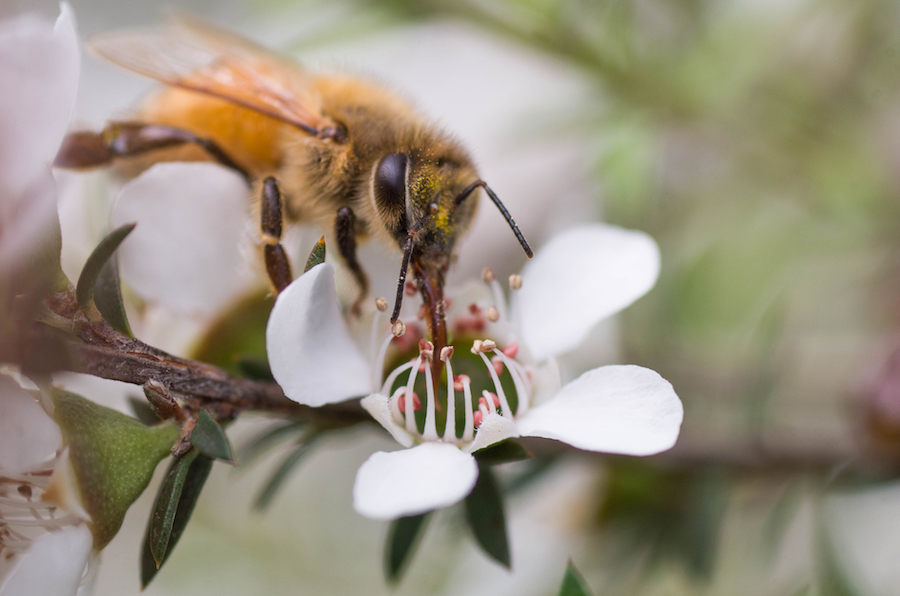5 reasons why you should be eating more manuka honey
Honey has long been praised for its healing properties, but health experts believe that it’s the manuka variety that packs the most powerful punch when it comes to fighting infection.
It’s produced in New Zealand by bees that pollinate the native manuka bush, a tea tree-like plant with white flowers. This type of honey tends to be darker, thicker and more difficult to spread than commercial breakfast varieties that have been heated to high temperatures in the pasteurising process and filtered to kill yeast.
Processing honey in this way, some health experts claim, removes the antibacterial activity, enzymes and goodness-giving nutrients that you can find in raw honey varieties like manuka.
Most authentic manuka honeys from New Zealand include a UMF rating on the label, although some producers instead use an MG or MGO rating (but they both contain the good stuff). These grading systems are used to measure the antibacterial strength of the honey.
Those without a rating tend to be cheaper varieties that are lacking in the properties that have made premium manuka honey so popular – so you should always check the label before you commit to buying.
Here, we’ve found just a few reasons why wellness types are getting into a buzz about it…
1. It’s great for a range of health conditions
“The antimicrobial properties in manuka honey mean that it can help with a host of health conditions,” says bee expert Dr Young Mee.
A 2017 study published in the journal Ophthalmic Plastic and Reconstructive Surgery found that manuka honey can help people who suffer from chronic sinusitis. Researchers reported daily manuka honey irrigations could be helpful in preventing biofilm-producing bacteria that causes congestion.
NHS guidelines also suggest that honey should be the first port of call for a sore throat, as its sticky texture can coat the throat and prevent irritating and tickly coughs and splutters.

2. It can help treat wounds
Multiple studies have found manuka to be effective in the treatment of wounds, helping to regenerate the tissue and providing a protective barrier on the skin.
A 1993 study looked into the effects of applying a manuka honey dressing on 40 people with non-healing wounds. The researchers reported that 88% of the wounds decreased in size, and that the dressings created an acidic environment, which helps to accelerate healing.
“Due to the antibacterial and antioxidant properties of manuka, it can be great for dressing wounds, sores and ulcers,” Mee explains.
“Applied topically, and in conjunction with other established methods for treating wounds, manuka can certainly speed up the healing process.”
3. It can be good for tooth decay
It sounds counter-intuitive, but manuka’s antibacterial effects can have benefits for your teeth and gums too. A 2004 study looked at whether chewing or sucking on a manuka honey chew could reduce plaque and gingivitis.
After three daily meals, participants were instructed to either chew on the honey chew for 10 minutes or chew a sugar-free gum instead. The honey-chew group showed a significant reduction in plaque and gingival bleeding, compared to those who chewed the sugar-free gum.
4. It’s easy to take
One of the best things about manuka is that it doesn’t require any complicated preparation. According to research from Holland & Barrett, who sell a range of certified New Zealand manuka honeys, the majority of their customers simply take a teaspoon of the stuff every day.
It also mixes easily into other drinks, teas and smoothies, and you can spread it on just about anything.
5. It’s long lasting and easy to store
Genuine manuka honey tends to be a lot pricier than jars of commercial honey, but it’ll last in your cupboard for years.
“Manuka honey has a thicker consistency than normal table honey. It’s an incredibly durable substance too, so doesn’t need to be kept refrigerated after it’s been opened,” says Mee. “Just try and keep your manuka away from direct sunlight as this can alter some of the naturally occurring chemical markers over time.”
The Press Association
Latest posts by The Press Association (see all)
- Could brisk walking boost your heart? - April 16, 2025
- Best spring-to-summer plants to fill the colour gaps - April 15, 2025
- Catherine tells how ‘spiritual’ connection with nature gives her peace in busy world - April 15, 2025
- Why weeds are worth cultivating – and eating - April 14, 2025
- 5 top tips for cleaning your tech, from phones to laptops - April 14, 2025





















